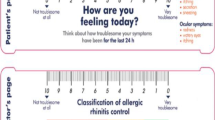Summary
This was a multicentre, double-blind study in 454 patients to compare the effectiveness and tolerability of fluticasone propionate nasal spray (FPANS) 200μg used once daily for 8 weeks on its own or in combination with oral cetirizine 10mg once daily in the treatment of seasonal allergic rhinitis. The results showed no significant difference between treatments in any of the symptoms or in the proportion of symptom-free days. Watery eyes were recorded as being the most troublesome symptom in the previous hayfever season, whilst during the study patients were, on average, free of eye symptoms for 56% of the time. Additionally, no difference was detected between the two groups with regard to the use of rescue medication. More than 75% of patients concluded at the end of the study that their symptoms had been adequately controlled and, similarly, investigators rated both treatments as being successful for the majority of patients. Overall, this study suggests that there is no significant difference in efficacy between FPANS 200μg, taken once daily in the morning, and FPANS 200μg once daily in combination with oral cetirizine 10mg, in the prophylactic treatment of seasonal allergic rhinitis.
Similar content being viewed by others
References
Davies R. Seasonal rhinitis in rhinitis mechanisms and management. I Mackay, editor. Royal Society of Medicine 1989: 97–116
Sibbald B. Epidemiology of seasonal and perennial rhinitis: clinical presentation and medical library. Thorax 1991; 46: 895–901
Allergy: conventional and alternative concepts. A report of the Royal College of Physicians Committee on Clinical Immunology and Allergy. Clin Exp Allergy 1992; 22: Suppl. 3
Horak F. Seasonal allergic rhinitis. Newer treatment approaches. Drugs 1993; 45(4): 518–27
Bryson HM, Faulds D. Intranasal fluticasone propionate. A review of its pharmacodynamic and pharmacokinetic properties and therapeutic potential in allergic rhinitis. Drugs 1992; 43(5): 760–75
Laforce C, Dockhom R, Findlay S, et al. Fluticasone propionate treatment for seasonal allergic rhinitis is safe and effective in adults and adolescents. Abstract 60. J Allergy Clin Immunol 1991; 87(1: Pt 2): 153
Ratner PH, Paull BR, Findlay SR, et al. Fluticasone propionate once daily is as effective as beclomethasone dipropionate twice daily in relieving symptoms of seasonal allergic rhinitis. Clin Exp Allergy 1990; 20Suppl. 1: 98
Johannessen TA. A comparison of fluticasone propionate, flunisolide and placebo in patients with seasonal allergic rhinitis to birch pollen - a multi-centre trial. Clin Exp Allergy 1990; 20Suppl. 1: 102
Cramer JA, Mattson RH, Prevey ML, et al. How often is medication taken as prescribed? A novel assessment technique. JAMA 1989; 261: 3273–7
Harding SM. The human pharmacology of fluticasone propionate. Respiratory Medicine 1990; 84Suppl. A: 25–9
Harding SM. Human pharmacology of fluticasone. Abstract no. AS 04. 04. Allergologie 1989; 12: 77
Davies BH, Mullins J, Couch HA. A comparison of cetirizine (Zirtek) and terfenadine (Triludan). Clin Trials J 1989; 26: 100–7
Beswick KBJ, Kenyan GS, Cherry JR. A comparative study of beclomethasone aqueous nasal spray with terfenadine tablets in seasonal allergic rhinitis. Curr Med Res Opin 1985; 9: 560–7
Drouin MA. Is there a benefit to add loratidine to topical nasal steroids in patients with moderately severe seasonal allergic rhinoconjunctivitis? Allergy 1992: Suppl. 12(47): 172
Dolovich J, Anderson M, Chodirker W, et al. Fluticasone propionate: a large multi-centre trial. Respir Med 1990; 84Suppl. A: 31–2
Darnell R. Multi-centre study of fluticasone propionate aqueous nasal spray and terfenadine tablets in seasonal rhinitis. Clin Exp Allergy 1990; 20Suppl. 1: 101
Acknowledgements
This study was funded by Allen and Hanburys Ltd, Uxbridge, Middlesex, UK.
Author information
Authors and Affiliations
Rights and permissions
About this article
Cite this article
Benincasa, C., Lloyd, R.S. Evaluation of Fluticasone Propionate Aqueous Nasal Spray Taken Alone and in Combination with Cetirizine in the Prophylactic Treatment of Seasonal Allergic Rhinitis. Drug Invest 8, 225–233 (1994). https://doi.org/10.1007/BF03258482
Published:
Issue Date:
DOI: https://doi.org/10.1007/BF03258482



